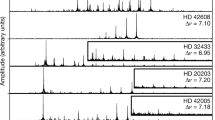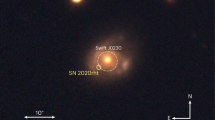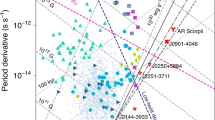Abstract
The pulsation period of PSR 0833–45 is known to be gradually increasing, but between February 24 and March 3 the periodicity abruptly decreased by two parts per million.
This is a preview of subscription content, access via your institution
Access options
Subscribe to this journal
Receive 51 print issues and online access
$199.00 per year
only $3.90 per issue
Buy this article
- Purchase on Springer Link
- Instant access to full article PDF
Prices may be subject to local taxes which are calculated during checkout
Similar content being viewed by others
References
Radhakrishnan, V., Cooke, D. J., Komesaroff, M. M., and Morris, D., Nature, 221, 443 (1969).
Large, M. I., Vaughan, A. E., and Mills, B. Y., Nature, 220, 340 (1968).
Large, M. I., Vaughan, A. E., and Wielebinski, R., Nature, 220, 753 (1968).
Author information
Authors and Affiliations
Rights and permissions
About this article
Cite this article
RADHAKRISHNAN, V., MANCHESTER, R. Detection of a Change of State in the Pulsar PSR 0833-45. Nature 222, 228–229 (1969). https://doi.org/10.1038/222228a0
Received:
Issue Date:
DOI: https://doi.org/10.1038/222228a0
This article is cited by
-
Pulsar timing irregularities and neutron star interior in the era of SKA: an Indian outlook
Journal of Astrophysics and Astronomy (2022)
-
Relativistic fluid dynamics: physics for many different scales
Living Reviews in Relativity (2021)
-
Microglitches in radio pulsars: the role of strange nuggets
Astrophysics and Space Science (2020)
-
The correlation between glitch activity and pulse profile changes for the Crab pulsar
Astrophysics and Space Science (2020)
-
The 2016 glitch in the Vela pulsar
Astrophysics and Space Science (2019)
Comments
By submitting a comment you agree to abide by our Terms and Community Guidelines. If you find something abusive or that does not comply with our terms or guidelines please flag it as inappropriate.



